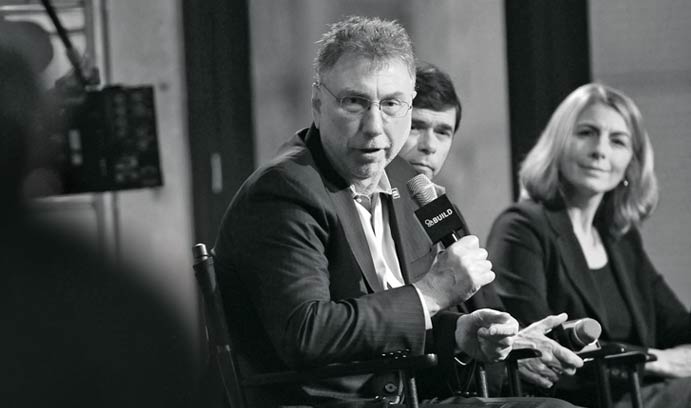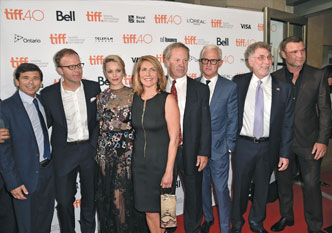In the Spotlight: Marty Baron

Marty Baron ’76, ’76G, ’14H, left, with real Spotlight reporters Michael Rezendes and Sacha Pfeiffer.
Spotlight, the film chronicling The Boston Globe’s 2002 investigation into the Catholic Church’s cover-up of clergy sex abuse, has put award-winning journalist Marty Baron ’76, ’76G, ’14H in the spotlight himself. Baron, who graduated from Lehigh with both a B.A. in journalism and an MBA, launched the Pulitzer Prize-winning probe as the Globe’s then-editor. He’s portrayed by Liev Schreiber in the film, which won two Academy Awards on Feb. 28—for Best Picture and Best Original Screenplay.
Baron, currently executive editor of The Washington Post, has held editorial leadership positions at several of America’s top newspapers. He is considered by present and former colleagues to be “the best news editor of all time,” according to Esquire.
In 2014, Baron delivered Lehigh’s 146th commencement address and received an honorary Doctor of Humane Letters degree. He was back on campus in mid-February for a Spotlight screening.
Now, Baron takes the Bulletin’s questions about Spotlight, journalism and those Lehigh years.
How much impact, If any, do you think Spotlight will have on the journalism industry?
The full impact remains to be seen. The movie already has brought acclaim from critics. And I know, from emails and Facebook posts and the like, that it has given a lift to many journalists. They feel affirmed and encouraged by Spotlight because it reflects accurately and honestly how we do our work, particularly investigative stories, and because it makes clear that our work can be essential in addressing wrongdoing.
I still say the full impact remains to be seen because I’d like to see its influence extend well beyond the morale of journalists themselves. I’d like to see it cause media owners, publishers and editors to rededicate themselves to investigative journalism. I’d like to see it cause a skeptical public to reflect on the necessity of journalism and, specifically, investigative reporting and what’s required to do it right. And I’d like to see it cause journalists and others to listen to people who seem to live at the margins of our society who’ve been left voiceless. They can have something very powerful to say, and they deserve a hearing.
Are you comfortable with Liev Schreiber’s portrayal of you? What did he get right?
I’m totally honored that Liev agreed to play me. He’s a superb actor, and I’m not an easy person to portray. He did an amazing job.
As I said at the Toronto Film Festival in front of a crowd of 2,000: How do you portray someone who does not emote? I have to defer to the judgment of those who know me well when it comes to the accuracy of the portrayal; that is, my professional colleagues and my closest friends. My professional colleagues almost all say, He nailed you. My very closest friends frequently say the character in the film did not capture my warmer, perhaps more redeeming, qualities. Thankfully, they believe I have some.
But I do have to remind my friends that the period captured in the film was not a joyful time for me. I had arrived at a newspaper where I knew pretty much no one. I knew almost no one in the city either. I had been labeled an “outsider” in Boston. Very quickly, we were into some awfully serious news events, too. We had launched the Church investigation, and I certainly understood the implications of that. Then there was 9/11. Those attacks took place six weeks after I got to Boston. And then, within days of those attacks, we had the anthrax scare. So it was a sobering time, and not an easy time for me personally.
You’ve had to navigate a number of controversies throughout your remarkable journalism career, not only the clergy sex abuse but also the National Security Agency’s secret surveillance programs. Where do you find the courage?
I don’t know that I’d describe it as courage. I’d rather describe it as a simple determination to do my job as a journalist. When there is an important story in front of us, when there is a subject of enormous public interest, or when there is wrongdoing, we have to do our jobs as journalists. We have to pursue the story. We have to discover the underlying truths. We have an obligation to bring before the public information they should know. If we have to confront powerful interests and pursue that journalistic obligation, we can’t be dissuaded. In fact, it should motivate us even more. Why? Because if not for us in the press, no one knows. No one would tell the public what it has a right to know. No one would expose the wrongdoing—because powerful interests would make sure it remained concealed.
You spent a lot of your time at Lehigh in the basement of the University Center, where The Brown and White had its editorial offices. What were you like as a college student?
I guess I was fairly studious. I was a good student. I got good grades, and I was interested in what I was studying. But I spent more time in the basement of the University Center, in the old offices of The Brown and White, than I did studying. The journalism for The Brown and White was work, but it was work worth doing. I’m happy to say that I came away from Lehigh with a great appreciation for the educational experience but also for the close friends I made. There weren’t dozens upon dozens of good friends, but there were enough—and the friendships I had were close and enduring.
Though you couldn’t have known where your journalism career would take you after graduation, did you think you could make a difference as a reporter and editor? If so, how?
When I arrived at Lehigh, it was right about the time of the Watergate scandal. So I couldn’t help but be absorbed by what was happening and the role that journalism—most notably my current employer, The Washington Post—played in that investigation. Midway through my college career, President Nixon resigned. You’d have to be clueless not to see the impact that journalism can have. That said, I didn’t go into the field expecting to do anything equivalent. But I felt that journalism served a social good in informing people about their community, country and world. And if those Watergate observations left me with a message, it was this: Central to the mission of journalism is holding powerful individuals and institutions accountable.
Today’s college campuses are different places. The Washington Post recently published an article that carried the headline “Can colleges protect free speech while also curbing voices of hate?” Where do you stand in the debate?
I favor free speech. I want people to be respectful, of course. But I believe that those who go to college should understand from the start that they will encounter ideas, words and people that make them uncomfortable or get them upset. My view of that: Welcome to the real world. And a college experience should be, at long last for many students, an introduction to the real world—not one their parents have sought to choreograph for them, not the world as they wish it would be, but the world as it is. And college is a good place to learn how to deal with it all, messy as it might be.
You disagree with something someone said or did. Then, yes, argue. There’s nothing wrong with a healthy argument. And we should all be able to cope with an angry argument. The worst thing, in my view, is to suppress speech and to prohibit argument.
The Washington Post recently moved into new headquarters, leaving behind The building where Woodward and Bernstein had made history. What does it mean for The Post’s future?
Our new facility pays homage to the history of The Washington Post in many ways. But it also conveys that we want to be a forward-looking news organization. The facilities themselves facilitate our progress in an information era that has been reinvented and that continues to be transformed at a rapid clip.
Within our newsroom, reporters, editors, videographers, data visualization specialists, social-media experts and engineers will all be more integrated. They’ll sit side by side. That’s because new storytelling forms have emerged that require the participation of all of them. That will increasingly be the case. The reason should be obvious: Most people are getting their information on digital devices. It could be your desktop computer or a tablet. But it’s mostly a mobile phone. This requires us to think hard about how the information we want to convey is received and processed by the reader, or user, or viewer.
It has become clear that the Internet is its own distinct medium. Newspapers are a distinct medium. So is radio. So is television. But so is the Web. Each of those mediums requires its own storytelling approach. You don’t read a newspaper story on television, for example. Instead, you write a television script. They’re different. So the Web is its own medium, and mobile also may be its own medium.
Changing habits of consuming news and information require us in the media to change in response. And that’s what we’re doing. Our new facilities will help us to do that. Ultimately, however, it is the people in the facilities who have to rise to the challenge.
Posted on:


